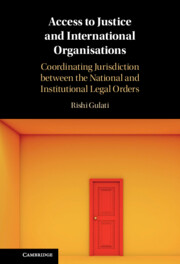Access to Justice and International Organizations by Rishi Gulati
‘ Access to Justice and International Organisations: Coordinating Jurisdiction between the National and Institutional Legal Orders’ by Rishi Gulati has just been published by Cambridge University Press. The author has kindly provided us with the follow summary:
Access to Justice and International Organisations: Coordinating Jurisdiction between the National and Institutional Legal Orders’ by Rishi Gulati has just been published by Cambridge University Press. The author has kindly provided us with the follow summary:
This book addresses some of the most difficult legal challenges that international institutions confront. As is all too evident, we live in a denial of justice age when it comes to the individual pursuit of justice against international organisations (IOs). Victims of institutional conduct are often denied reasonable means of dispute settlement at the international level. Victims are also generally unable to seek justice at the national level due to IO immunities, which aim to secure institutional independence. Access to justice and IO independence are equally important values and satisfactorily realising them both has so far proven elusive. In this book, Rishi Gulati argues that private international law techniques can help allocate regulatory authority between the national and institutional orders in a nuanced manner by maintaining IO independence without sacrificing access to justice. As private international law rules can be adjusted nationally without the need for international action, the solution proposed can be readily implemented, thereby resolving a conundrum that public international law has not been able to address for decades.
The book is divided into five chapters. Chapter 1 provides the basis of, and nature of an IO’s access to justice obligation. It demonstrates that under international law, IOs must provide ‘appropriate’ modes of dispute resolution to the victims of institutional conduct. Relying on international human rights law in general, and the right to a fair trial in particular, chapter 2 goes on to specify the criteria for assessing the ‘appropriateness’ of dispute resolution mechanisms that should be created at IOs. The discussion does not stop here. Chapter 3 goes on to rigorously apply those criteria to assess dispute resolution mechanisms at IOs, where such mechanisms even exist. It is concluded that where such mechanisms exist, they tend to be deficient. This is the case with several international administrative tribunals created to resolve employment disputes. Alarmingly, in many instances, dispute resolution mechanisms are completely absent, meaning that a denial of justice is a foregone conclusion.
It is thus hardly surprising that more and more, national courts are asked by victims to adjudicate claims against IOs. However, adjudication at the national level is complicated due to the existence of an IO’s jurisdictional immunities before national courts. Chapter 4 considers the nature of institutional immunities, and shows that the application of IO immunities is a conundrum that is yet to be resolved. This chapter considers the latest jurisprudence on the topic. It provides a succinct analysis of all aspects of the law on IO immunities, showing that the manner in which the law is currently applied results in further denials of justice. It is pointed out that no satisfactory solution has been implemented to realise access to justice for victims and an IO’s functional independence simultaneously. Chapter 5 resolves this long-standing international legal challenge. It shows how private international law techniques can be used to realize access to justice in claims against IOs but without compromising on IO independence. This book shows how the various branches of public international law, including international human rights and international organisations law, do and should interact with private international law with a view to solve a particularly difficult regulatory challenge. The work is not only intended to be academically rigorous, but it seeks to provide real life answers to hard cases.


